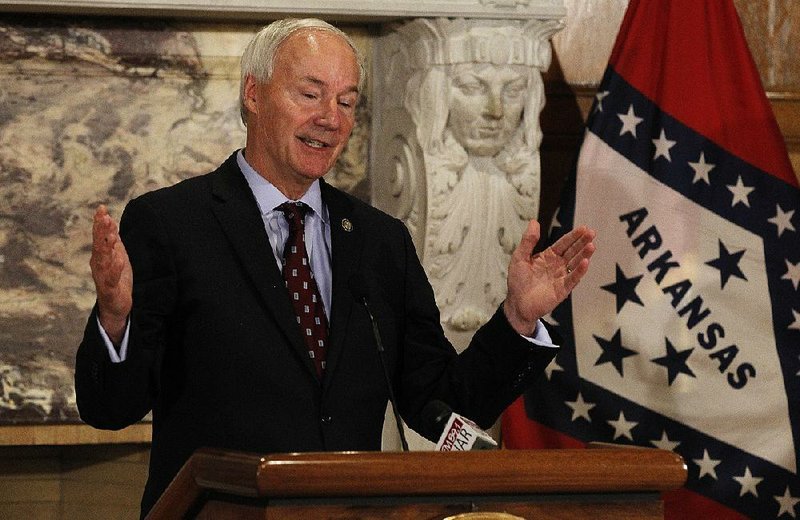Gov. Asa Hutchinson signed an 18-week abortion ban into law on Friday, making Arkansas' abortion policy one of the most prohibitive in the U.S.
The Republican governor signed House Bill 1439 by Rep. Robin Lundstrum, R-Elm Springs, which will outlaw abortion 18 weeks into a woman's pregnancy except in medical emergencies and in cases of rape or incest.
Abortion opponents trumpeted the bill as a victory for the unborn, but abortion-rights advocates decried the law as unconstitutional, promising to sue the state.
Marjorie Dannenfelser, president of the Susan B. Anthony List group, thanked Arkansas lawmakers for HB1439.
"Arkansas has some of the nation's strongest pro-life laws and continues to expand protections for unborn children and their mothers, informed by science and compassion," Dannenfelser said. "At 18 weeks, nearly halfway through pregnancy, unborn babies are beginning to move and can hear sounds. Their facial features are developing, and an ultrasound can show if the child is a boy or girl. The humanity of the unborn child and the brutality of abortion is undeniable."
Meanwhile, Rita Sklar, executive director of the American Civil Liberties Union of Arkansas, said the General Assembly put its ideology ahead of women's health care.
[RELATED: Complete Democrat-Gazette coverage of the Arkansas Legislature]
"This bill is a dangerously extreme attack on abortion access and another heavy-handed government intrusion into a woman's personal medical decisions," Sklar said. "The Supreme Court has been clear: important medical decisions should be made by women and their doctors -- not dictated by politicians or government bureaucrats. We've successfully challenged these kinds of unconstitutional abortion bans before -- and we're fully prepared to do so again. Governor Hutchinson: we'll see you in court."
Hutchinson said earlier this week that he believes the legislation can survive court challenges.
Arkansas is the third state to restrict abortion 18 weeks post-fertilization, joining Mississippi and North Carolina. Utah's state Legislature has advanced a similar measure to the governor there.
The Arkansas law will take effect 90 days after the General Assembly officially adjourns the current legislative session, which is expected in May.
Arkansas is one of 19 states that have enacted bans on abortion past 20 weeks, according to the Guttmacher Institute, a Washington, D.C.-based research group that supports abortion rights.
A federal judge in Mississippi struck down an attempt to ban abortions after 15 weeks last year.
Most abortions at the state's three abortion clinics are performed before 16-18 weeks of pregnancy, according to statistics from the Arkansas Department of Health.
Of the 3,249 abortions the Health Department recorded in 2017, only 173 were performed at 16 weeks or later. That number dropped to 75 after 18 weeks.
Gloria Pedro, the Arkansas manager of public policy and organizing for Planned Parenthood Great Plains, said she believed HB1439 was unconstitutional because Roe v. Wade set the standard that abortion is legal up to the point of viability, and an 18-week-old fetus typically isn't considered viable.
"We know that laws like this are designed to restrict access to abortion," Pedro said. "It will make it harder for women in this state to access health care, which is a negative impact. Women should have access to excellent health care, not just at any point during pregnancy, but any point during their life."
Arkansas' Legislature earlier this year passed a "trigger law" that would ban abortion in Arkansas if the U.S. Supreme Court reverses Roe v. Wade or if the U.S. Constitution is amended to allow states to prohibit the procedure.
On Thursday, the state Senate passed a measure that would require physicians who perform or induce abortions to be board-certified, or eligible for such certification, in obstetrics and gynecology. The bill, which now heads to the House for consideration, would also expand the definition of "viability" to include a fetus that, in a physician's judgment, can live outside the womb on life support "in light of the most advanced medical technology."
Information for this article was contributed by Michael R. Wickline of the Arkansas Democrat-Gazette.
Metro on 03/16/2019
